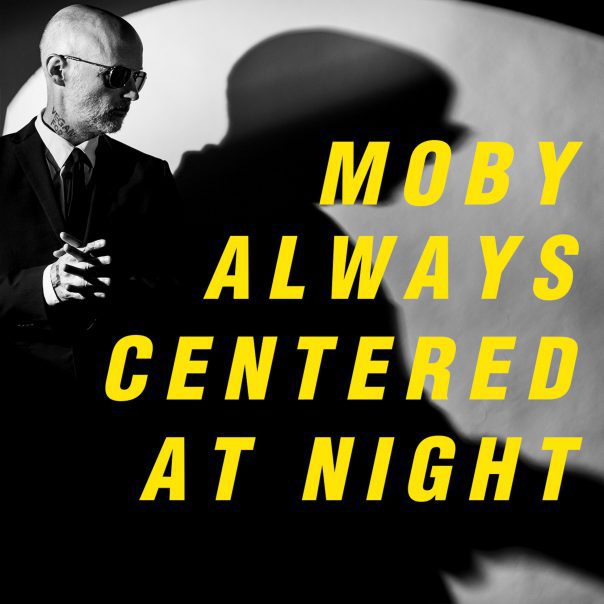ALBUM REVIEW: Moby finds comfort ‘always centered at night’

Moby, “Always Centered At Night.”
This year marks the 25th anniversary of Moby‘s platinum album Play. To honor the occasion, the acclaimed DJ and producer is undertaking a short European tour, with all proceeds going to animal rights organizations. Electronic music fans across the globe won’t be left out, as Moby is also releasing new collaborative album always centered at night.
always centered at night
Moby
Mute, June 14
8/10
Get the album on Amazon Music.
Always centered at night is electronic music at heart, but also pulls from other styles like jazz, rock and R&B. Moby blends signature sounds from these different styles with his own. The most important sound here is the human voice. Every track features a powerful singer. These artists live up to the bar Moby’s past collaborators have set. Each song has its own way of affecting your emotions.
The heavy piano playing, fading vocal loop and long bow draws on the strings set the album off to a melancholy start. “On air,” with serpentwithfeet, is a taste of things to come. It draws you inward, as the crooner realizes his love is over. His quivering voice captures the pain of losing that love, as well as the possible delusion that there’s a chance: “May the shadows leave the spirit at night.”
“Dark days,” a new collaboration with Lady Blackbird, lifts the mood. Atmospheric guitar plating creates a space for her voice to soar away, taking listeners along for the ride. This song oozes with feeling, the source of which is the bass line. All the sounds blend harmoniously together in an ever-moving wave of music.
The late British animal rights activist, poet and musician Benjamin Zephaniah takes the lead on “where is your pride?” He and Moby worked on the track before Zephaniah died in late 2023 at 65. True to Zephaniah’s mission in life, the poignant track encourages compassion and a reevaluation of your values. The song’s secondary purpose is honoring his memory. The fast breakbeat incorporates chanted lyrics and tense oscillating synth chords. The effect may leave you feeling exposed, but with your passion reignited.
Sudanese-born and Netherlands-based R&B singer-songwriter Gaidaa appears on “transit,” a literal transition. “I’m better off alone,” Gaidaa sings somberly. The slow industrial beat and ascending and descending piano chords show the time and significance of this change. Moby’s signature strings bring in the light and confirm the singer is in fact “better off.”
“Wild flame,” with Danaé Wellington, pumps always centered at night with energy from its raindrop plucks and bongo beat. One of the groovier songs on the album, it encourages you to dance while getting lost in the imaginative lyrics. Wellington’s captivating voice brings the imagery to life. Moby and J.P. Bimini add another shot of energy on “should sleep.” Squishy synth and and funky bass, keys and guitar pair with Bimini’s soulful vocals, and the end result is full of groove.
“Medusa,” with Aynzli Jones, uses a slow, crunch-sounding synth over a double-time beat to create a dizzying descent into a hallucinogenic state. Jones has hints of gospel in his voice, which pair with the wise, psychedelic lyrics to make the song feel slightly reassuring within its disorienting instrumental.
From here, Moby and Brie O’Banion gently sweep you away with a cover of Cream’s dirge-like “We’re Going Wrong.” As on the original, it’s s slow burn, building suspense, but it replaces the guitars with crackling electronica, a la Massive Attack. “I found out today/ We’re going wrong,” Brie sings, her voice swirling with emotion.
A hooking bongo and bell combo begins the jazzy and ethereal “fall back,” with Akemi Fox, whose echoing vocals create a dreamlike atmosphere.
RELATED STORIES:
• REVIEW: Moby digs further into the blues and his wall of sound on ‘Resound NYC’
• REVIEW: Moby recreates the magic on ‘Reprise’
• REVIEW: Moby’s ‘All Visible Objects’ is a satisfying throwback with a confusing ending
“Sweet moon,” with SoCal singer Choklate, injects always centered at night with a desert rock sound. It is an abrupt switch, but her penetrating voice, along with Moby’s craftsmanship, makes it feel like a natural progression. She sings about “the sweetness of the cool moon,” painting another beautiful nighttime image.
The album ends on “ache for,” featuring José James. Clean, calm piano lines are laid over slow brushed snare drumming. James’ jazzy voice completes the picture of a rainy New York night. James is flooded with questions and is suddenly desperate for answers. “Maybe I never knew, or maybe I never asked,” he sings. The album is true to Moby’s signature sound: warm, captivating instrumentals and passionate vocals. It encourages self-reflection and explores the healing nature of night.
